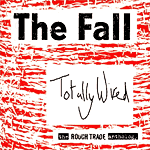|
|
|
|
|
| archive : A B C D E F G H I J K L M N O P Q R S T U V W X Y Z | ||||
|
| ||
 The Fall
The FallTotally Wired: The Rough Trade Anthology [Castle/Sanctuary; 2002] Rating: 9.5 If you've managed to make it this far in life without discovering The Fall, put off whatever purchases you were planning next and buy, instead, three records: This Nation's Saving Grace, Hex Enduction Hour, and this newly released two-disc set, Totally Wired: The Rough Trade Anthology. The music contained here is nothing short of absolutely essential, epochal rock and roll that sounds like nothing else, including the racks upon racks of albums it eventually inspired. Staggering out of industrial Manchester, England at the height of the post-punk era on a lo-fi bed of jagged, intoxicated guitar work and swaggering rhythm, The Fall were like an alternate rock and roll reality, an entire musical universe unto themselves. Vocalist and band mainstay Mark E Smith's scattershot, loquacious delivery and Northern pride put him in a league of his own, where his sneering, often indecipherable vocals ranged from shocking to hilarious to deeply political, and were never any less than absolutely thrilling. The Fall's three-year tenure at Rough Trade Records is the stuff of legend, full of rancorous label/band fighting (Smith later said he'd rather retire than record for them again), furious live shows, and music that would forever alter the course of independent music. Some of The Fall's best songs are scattered across the two discs of this set. The only other period during which the band were this consistent in their 2½-decade-long (and counting) career was the one that immediately followed it, when the band signed to Beggars Banquet and released some of their best work-- including 1984's The Wonderful and Frightening World of The Fall and their 1985 classic This Nation's Saving Grace, both of which saw them incorporating more distinct pop elements into their sharp-witted, staggering cut-and-thrust. The set opens with the track it was named for, a 1980 single that later appeared on the US edition of Grotesque (After the Gramme). The song is as indicative of The Fall's signature sound as any other, but it's also perhaps one of their most accessible. First come the stomping drums, briefly recalling the opening moments of The Ramones' "Do You Remember Rock 'n' Roll Radio", though the similarity ends when Smith grandly announces, "I'm totally wired," his voice stuttering and cracking, turning an otherwise routinely declamatory line into a frantic yelp. The band members echo his chorus, but it's during the verses that Smith drops the song's best lines: "You don't have to be weird... uh-to be... wiiiired... and I'm always worried." It's stunning to hear how consistent this band was in their heyday. Throughout their countless genre explorations, they never failed, and always wound up, somehow, sounding like nothing other than The Fall. "That Man" is old-fashioned 50s rock 'n' roll, as if the Cold War had really become the nuclear holocaust it always threatened to. "The Man Whose Head Expanded" hints at schlocky New Romantic synth-pop with its bleeping keyboard preset (the same one used by Trio for their Volkswagen-resurrected hit "Da Da Da"), but Smith's rant pulls it back from the brink and the guitars send it lurching into a wandering breakdown and frenzied build-up. The mighty "Rowche Rumble", one of the band's defining tracks, soon follows, with Smith's sarcastic opening claim, "Well, this is a groovy number," preceding the nailbomb-like explosion of Marc Riley's and Craig Scanlon's guitars into a jaw-dropping riff. Elsewhere, "Pay Your Rates" barrels through production that makes Vampire on Titus sound like Kylie Minogue, while "New Puritan" sounds as though it could have been recorded off a depression-era radio show receiving the future of harrowing, abstract art-punk mayhem. And the sinister riffs of "Pay Your Rates" and "Prole Art Threat" are designed for the sole purpose of detonation and destruction: raw pummeling with little consideration for the rest of the band. Though neither of these discs are arranged in chronological order, the second largely consists of later material than the first, focusing primarily on 1983's Perverted by Language. The album marked the debut of Smith's future wife Brix with the band, and a turn toward slightly more accessible (or at least less grinding) music, and though none of it was ever going to threaten the top of the charts, the group was opening up to a less improvisational stance that made for more direct hooks. In fact, this was the era in which The Fall would do their best work yet, balancing dissonant crunch with more rigid structures. This compilation is invaluable: it's the first time a truly exhaustive compilation of some of The Fall's best material has been made available stateside, where the stuff has long been difficult to track down. Compiling the work of a band like The Fall would be a maddening task, with literally dozens of releases in multiple formats scattered across more than a half-dozen labels. Totally Wired provides an excellent starting point for one of their best periods. Though it does stop short of the thoroughness that might make it a true anthology, Totally Wired pulls from every Rough Trade release The Fall recorded, providing a quality roadmap for where a listener might want to go next, and that's indispensable for a band so worth exploring. -Joe Tangari, October 10th, 2002
|
||





